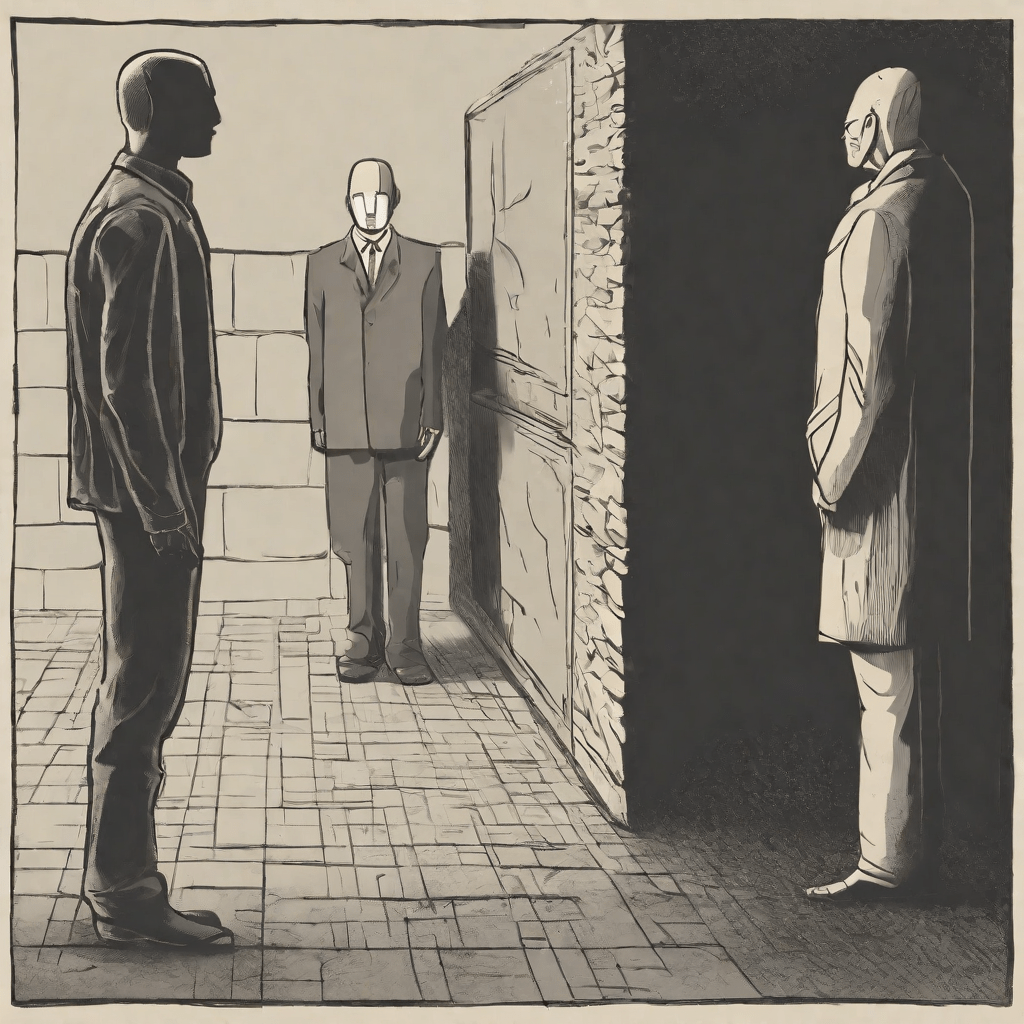What Are the Four Horsemen in Psychology

Most of us have heard of the Four Horsemen in the biblical sense, specifically, in the Book of Revelation. Symbolizing the catastrophes of War, Famine, Pestilence, and Death, these figures offer a chilling representation of ultimate destruction.
But who knew they also had a significant bearing on the realm of psychology and personal relationships?
Coined by Dr. John Gottman, a renowned relationship expert, the term “Four Horsemen” is used in psychology to elucidate four negative communication patterns that can prove harmful to a relationship.
Akin to their biblical counterpart, these Horsemen bring about destruction, not on a global scale, but in the intimate world of partners.
Understanding and identifying these patterns is not just crucial for psychologists and therapists, but for everyone. Why?
Relationships are the crux of our personal life, and the way we communicate within them significantly impacts our psychological well-being. A relationship marred by continual communication problems often leaves mental scars, laying the groundwork for further issues, personal and relational.
It’s safe to say that the Four Horsemen concept brings forth a critical approach to handle personal relationships in a healthier manner.
What exactly are these Four Horsemen in psychology? Named Contempt, Criticism, Defensiveness, and Stonewalling, each constitutes a destructive communication pattern, sabotaging the essence of productive and positive discussions.
Each Horseman has a unique way of instigating damage – but all ultimately corrode the relationship’s fabric, paving the way for breakups, separations, or continuance in a state of perennial unhappiness.
Contempt, possibly the most dangerous of the Four, involves treating the partner with disrespect, sarcasm, and scorn. It results in the targeted person feeling despised and worthless.
Then there’s Criticism, a critique not about a specific action or behavior but about the person’s character or personality. Criticism shatters self-esteem, often leaving the individual defensive and sad.
Speaking of Defensiveness, this Horseman takes center stage when a person perpetually perceives themselves as a victim, dodging accountability for their actions.
Last but not least, is Stonewalling – a damaging defense mechanism where a person wholly withdraws from interaction, blocking off any hope for resolution or positive communication.
In the following discussion, we will dissect each of these Four Horsemen, unveiling their full impact and strategies to overcome them.
Contempt

Definition and understanding of contempt in psychology
When considering the Four Horsemen in psychology, contemptuous behavior mirrors the devastation War wreaks in Book of Revelation’s apocalypse symbolism.
In psychological jargon, contempt represents an intense feeling of disrespect or inferiority towards the partner. The famous psychoanalyst, Sigmund Freud, described it as the unwelcome displacement of anger that could lead to personal or emotional famine and death, eventually damaging the roots of relationships.
How contempt manifests in relationships
Contempt usually rears its head in relationships through non-verbal signs: sneering, sarcasm, eye-rolling, and mocking. Its gestures are powerful, capable of delivering judgment day upon affectionate bonds.
Verbal delivery may include hostile humor, passive-aggressive remarks, or belittlement. In essence, the person displaying such behavior sees their partner as beneath them, creating an unhealthy power dynamic.
The impact of contempt on a person’s psychological state
From a psychological perspective, contemptuous behavior heavily impacts a person’s mental health, decimating their self-esteem.
It’s a destructive cyclic process: the more an individual is subjected to belittlement, the less valuable they perceive themselves to be. This negatively impacts their mental health, affecting their overall life satisfaction and happiness quotient.
Example of contempt within a relationship
Take, for example, the case of Tom and Sarah. Sarah often found herself on the receiving end of Tom’s sarcastic remarks. Initially, she believed it was just Tom’s way of showing affection.
However, as the years passed, Sarah gradually noticed changes in her psyche. She started doubting her worth, her confidence dwindled, and she became withdrawn.
A careful analysis brings to light that this change in Sarah’s psycho-emotional state was direct fallout of Tom’s contemptuous behavior, much like the impact of War in the Four Horsemen painting.
Criticism

Definition and understanding of criticism in psychology
The second of the Four Horsemen in psychology is Criticism. Much like its predecessor, it parallels with one of Revelation’s horses: Famine.
Famine evokes an image of an overall dearth – lacks, deficits. Similarly, unconstructive criticism creates an emotional famine: a lack of positivity, encouragement, and support.
Criticism in psychology refers to the act of expressing disapproval by noting the faults or the mistakes of the other person. It often manifests in blaming the person instead of their behavior, labeling them, and making them feel guilty.
Differentiating between constructive criticism and destructive criticism
Though interchangeably used, there’s a significant difference between constructive and destructive criticism. Constructive criticism, often shown as feedback, is necessary for personal growth and learning.
On the other hand, continuous destructive criticism or negative criticism chips away at the individual’s self-esteem, leading to adverse psychological impacts, such as anxiety and depression.
Example of criticism within a relationship
Consider Lucy and Jack’s relationship. Jack, a perfectionist in his domain, often critiqued Lucy about her habits, manners, and skills, which she initially took as Jack’s way of helping her improve.
However, Jack’s constant harsh remarks made her feel incompetent and undermined her confidence. This ongoing bitterness is a practical illustration of criticism, depicting how it often leads partners towards conflict and disagreement, much like the biblical prophecies before the End Times.
Defensiveness

Definition of defensiveness in psychology
Defensiveness, the third of the Four Horsemen, resonates with the symbolic representation of Pestilence in the Book of Revelation. Just as Pestilence spreads, causing widespread malaise, defensiveness cultivates an unhealthy environment within relationships, leading to emotional distress.
The psychological implications of defensiveness and its role within human interactions
In psychology, defensiveness designates a mechanism that an individual employs as a shield against the perceived attack, refusing to acknowledge their shortcomings while often blaming the other party.
It’s an unconscious attempt to guard oneself from a perceived threat, but it often escalates the conflict instead of resolving it. At the heart of defensiveness lies the failure to take responsibility for one’s actions.
Defensive behavior usually arises from an angular perception – a misguided and narrow viewpoint wherein the person views themselves as perpetually ‘right’.
Regardless of how factual the criticism might be, a defensive person processes it as a direct assault on their persona, shielding themselves behind the walls of denial and counter-blame.
Example of defensiveness within a relationship
An apt example is the relationship between Rob and Lisa. Lisa, being sensitive to feedback, became defensive whenever Rob pointed out an issue or mistake. While Rob felt he was trying to sort out their problems, Lisa felt attacked.
Over time, this defensiveness led to numerous unresolved arguments and, eventually, a distance between them, mirroring the spread of pestilence in biblical prophecies.
Stonewalling

Definition of stonewalling in psychology
Unlike its fellow horsemen, Stonewalling aligns more subtly with the biblical forewarnings. Much like Death claimed life in the Four Horsemen painting and the End Times, stonewalling, too, sucks life out of relationships.
In the context of psychology, stonewalling equates to emotional unresponsiveness, which severely curtails the pursuit of resolution and mutual understanding.
Identification of stonewalling behavior within relationships
Stonewalling can be identified primarily through silence, lack of engagement, indifference, or plain avoidance. It’s essentially a refusal to communicate or express feelings.
An individual practicing stonewalling may appear emotionally absent, displaying little to no reaction to their partner’s feelings or concerns. This act often leaves the other person feeling abandoned, similar to the desolate aftermath of the Apocalypse Horsemen’s passage.
How stonewalling affects communication and interpersonal dynamics
By impeding open communication channels, stonewalling introduces severe complications in relationships.
It impedes relational growth and promotes an atmosphere of frustration and resentment. The absence of dialogue keeps issues unresolved, fanning the flames of conflict rather than diffusing them.
Example of stonewalling within a relationship
Consider the case of Samantha and Neil. Whenever arguments arose, Neil would shut down, taking refuge in silence, unwilling to engage or address the issue at hand.
Samantha, therefore, kept grappling with the problems by herself, which made her feel isolated and disregarded.
The Interrelation of the Four Horsemen
How these behaviors can often occur synchronously within relationships
Just as the Four Riders of the Apocalypse work synchronously to mark the End Times, the Four Horsemen in psychology often work in unison, each amplifying the other’s negative effects, culminating in a relationship fraught with turmoil and emotional distress.
They are interrelated, feeding off each other in a destructive cycle that erodes the bond and understanding between individuals.
The cumulative impact of these behaviors on individuals and relationships
The detrimental effects of these behaviors permeate individuals’ emotional health and the overall health of the relationship.
A perpetually criticized individual would eventually become defensive, indicating the interplay between Criticism and Defensiveness.
The criticized individual might, in retaliation, exhibit Contempt, which, in turn, could lead the other partner to Stonewall, thus driving the final nail in the coffin of effective communication.
Example of interrelation of the Four Horsemen within a relationship
Look at the tumultuous relationship of Bonnie and Clyde. Bonnie’s contemptuous behavior led Clyde to criticize her repeatedly, prompting them both to shield themselves behind defensiveness and ultimately resort to stonewalling each other.
It was as if they were living out a dramatized version of the Christian Eschatology, with their relationship standing in for the world on judgment day.
Navigating & Mitigating the Four Horsemen
Understanding key strategies in responding to these behaviors
Just as biblical prophecies forewarn mankind about the Four Horsemen of the Apocalypse, Gottman’s Four Horsemen in relationships can be a cautionary signal.
Recognizing these detrimental behavior patterns is the first step towards navigating and mitigating their pervasive influence.
The response to these behaviors revolves around the communication technique known as the ‘Gottman-Rapoport Intervention.’
This model encourages a culture of respect, appreciation, acceptance of influence, and open discussion about each person’s else’ needs in a relationship.
Techniques for communication to minimize the impact of the Four Horsemen
To minimize the destructive impact of the Four Horsemen, it’s essential to consciously avoid contempt, use “I” statements to express concerns, accept accountability, and engage in intentional listening and communication instead of stonewalling.
Example on the successful managing of the Four Horsemen behaviours
An illustrative case study involves a couple, David and Karen. They were on the brink of separation. Recognizing their conversations were laced with the Four Horsemen, they sought help.
After weeks of therapy employing Gottman’s recommended techniques, they managed to rescue their relationship from the brink of disaster.
They successfully transformed their pattern of communication from decay to growth, replacing contempt with respect, criticism with understanding, defensiveness with acceptance, and stonewalling with open conversation.
This turnabout mirrors the devastating passage of the Four Horsemen into a ray of hope, showing us that while these patterns may seem as foreboding as a judgement day prophecy, they can be mitigated and transformed.
Recognizing and Navigating the Four Horsemen in Our Psychological Landscape
In the grand theatre of human relationships, understanding the roles played by Dr. Gottman’s Four Horsemen can no longer be an understudy; it needs to take center stage.
Almost like conducting our personal Armageddon, these four behavioral patterns—contempt, criticism, defensiveness, stonewalling—are formidable foes to the peace, harmony, and mutual growth within our emotional microcosm.
The pressing need for awareness of these intersubjective patterns is profoundly important.
While endemic to human nature, these behaviors can wreak havoc on our psychological well-being and relational dynamics when left unchecked, severe enough to trigger our personal end times.
Recognizing these patterns in our interactions and conversations can mark a pivotal moment in our relational journey: a start to the long road of recovery, reconciliation, and relationship building.
As grim as a Four Horsemen painting, these destructive communication habits may appear to be the harbingers of relationship demise, echoing the somber notes of biblical prophecies and apocalyptic symbolism.
However, bearing the torch of understanding and introspection, we can wage our fight against these habits, mitigating their influence, and steering our relationships away from the rocky shores of breakdown towards the tranquil waters of open, healthy communication and mutual respect.
There is immense power in recognition, understanding, and effective communication—enough to transform vast pastures of contempt into fertile lands of admiration, thorny bushes of criticism into supportive platforms of constructive feedback, fortress-like barriers of defensiveness into bridges of acceptance, and icy walls of stonewalling into warm firesides of conversation.
Emphasizing the potential transformation in personal life by understanding and mitigating the effects of these Four Horsemen in psychology is akin to transforming the apocalyptic representation of the end times into a new dawn.
It is a vital and transformative journey that begins with awareness, extends through understanding and communication, and culminates in the nurturing of healthier, more respectful relationships.
In conclusion, just as mankind finds hope and redemption in the face of apocalyptic prophecies, so must we face the Four Horsemen within our personal relationships: with awareness, understanding, and the unyielding belief that we can transcend them to foster healthier, happier connections.
